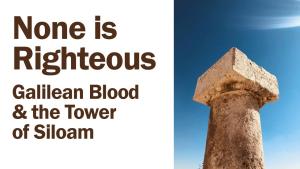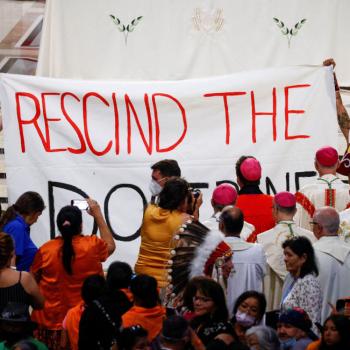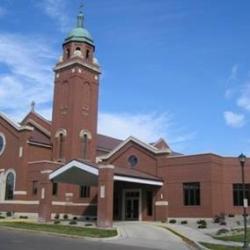
A massacre in the Temple and a fatal tower collapse – stories, or maybe rumors. In Chapter 13 Luke’s Gospel starts sounding a bit like 21st century USA. Some people, convinced of their own righteousness, accost Jesus with a story that has righteous anger written all over it.
Pilate, the Roman governor, has ordered the massacre of several Galileans while they were offering sacrifices in the Temple. Luke doesn’t tell us whether the story is true or not. What little evidence we have from our vantage point leans both for and against its veracity. As in our day, the fact that a horror story supports one’s political position is reason enough to repeat it. Luke’s interest is not in the story itself but in what Jesus thinks of the righteousness people attribute to themselves.
Tenth in a series on social justice in the Gospel of Luke.
Luke 13:1-5 and the politics of the day
At that time some people who were present there told him about the Galileans whose blood Pilate had mingled with the blood of their sacrifices. He said to them in reply, “Do you think that because these Galileans suffered in this way they were greater sinners than all other Galileans? By no means! But I tell you, if you do not repent, you will all perish as they did! Or those eighteen people who were killed when the tower at Siloam fell on them—do you think they were more guilty than everyone else who lived in Jerusalem? By no means! But I tell you, if you do not repent, you will all perish as they did!”
Flavius Josephus was a Jewish historian born just a few years after Jesus’ death by Roman crucifixion. From non-biblical sources like him and from the Bible itself, we learn about the politics of first-century Palestine. Jesus’ homeland was occupied by Rome. Native peoples’ reactions to Rome ranged from cooperation to acceptance, to withdrawal, to passive, active and even violent resistance.
Naturally, relations among these groups of Jews were far from peaceful. So when “some people” come to Jesus with a story about a massacre, they’re not just reporting the news of the day. They’re looking for a response, and they have their own idea about what that response should be.
The talebearers and the tale
I’ll be mentioning this group that Luke refers to as “some people” often, so they could use a better name. Since they’re telling a story, I’ll call them the Narrators, or “N and N” for short. (Jesus also takes a turn at telling a story, but he already has a name.)
So “N and N” come to Jesus with a story that sounds horrible and, as Luke relates it, also strange to modern ears:
At that time some people who were present there told him about the Galileans whose blood Pilate had mingled with the blood of their sacrifices.
Kenneth E. Bailey gives an excellent modern equivalent. (Through Peasant Eyes, p. 76) Imagine, he says, an armed group attacking a Christian congregation in the middle of Sunday Liturgy just as people are receiving Communion. Imagine the spilled contents of the Cup of Blessing “mingling with” with the blood of the victims on the floor. Then you can imagine the horror Jews would feel at the deed that Pilate was supposed to have done.
The motive
To understand Jesus’ response to “N and N,” it helps to think about who would tell such a story and why. I’m guessing that they’re not any of Jesus’ well-placed opponents worrying that Jesus might upset a system that worked well enough for them. They regularly contested with Jesus, trying to get a response that would land Jesus in trouble with the Romans. But Luke generally names Jesus’ antagonists in those conflict situations. They are scribes or Pharisees or teachers of the Law. Here the Narrators, the unnamed “some people,” must be from some other group. Probably they are among those chafing at Roman oppression, perhaps even some of the Zealots, who answered Roman violence with violence of their own. Judging by the gruesome way they tell the story – blood mingling with blood — they almost certainly have a firm sense of their own righteousness.
Such stories in such a situation are meant to be provocative. Jesus is supposed to react with appropriate disgust and anger. But there seems to have been some doubt about where Jesus stands. In the minds of “N and N” —
Sometimes he sounds like one reliably on the side of us oppressed poor. Other times he seems to have some other agenda. We’d like to know where he stands. What’s his level of commitment to our cause?
Just like today
In today’s political world horror stories about the “other guys” abound. Their purpose is to firm up a group’s commitment to the cause. Maybe to convince others to join. I like to ask these storytellers, Have you checked your sources? Or else, I fact-check for them and find, usually, that the story is bogus. I do it even when the storytellers and I share a political view. It’s a habit of mine, and most people, convinced they’re on right side of a fight, find it annoying.
When you can’t directly attack a story, the next political move is to come back with a contrary story. It’s “Yes, but what about ….” In our day that sort of response is common. People speak past each other and it leads nowhere except to draw political lines even bolder and, perhaps, to a literal fight.
Jesus does come up with another story. It’s subtly but effectively contrary to the first, as will appear below. Unlike a similar controversy with Jesus at his home town of Nazareth (see this post), Luke doesn’t say whether violence follows. And this time Jesus dares to make a direct accusation: The presumed good guys are sinners too.
The need for repentance
“Our hands are not clean either.”
Imagine saying that, when the all-important thing is firming up an effective political or wartime coalition. But that’s Jesus’ first response to “N and N.” More precisely, here again is what Jesus’ said:
Do you think that because those Galileans suffered in this way they were greater sinners than all other Galileans? By no means! But I tell you, if you do not repent, you will all perish as they did!
First, Jesus seems to undo the connection in most people’s minds between suffering and sin. You can’t explain people’s suffering by saying they must be sinners and God is punishing them. But then Jesus seems to remake the connection: If you don’t repent (stop sinning), you’ll meet the same fate as they. But Jesus isn’t really contradicting himself.
Jesus says “by no means” are these Galileans greater sinners than other Galileans. I get the feeling that Jesus is looking directly at some Galileans, namely “N and N.” Their story then would be about people they know, maybe even neighbors or relatives. I imagine both groups of Galileans, the ones who died and the ones telling the story, are seething with hatred of Rome. The first group, the victims, would be under suspicion of being insurrectionists. They’re from Galilee, after all, a region known to be a hotbed of anti-Roman activity. And Jesus says, They’re not worse sinners than you. “N and N” would be, at least, sympathizers with the anti-Roman cause, and that puts them in danger from Rome, not from God.
Sympathy with or even engagement in insurrection is not their sin. Jesus doesn’t take a stand with the revolution, but he doesn’t speak against it, either. He has a deeper issue in mind, one that applies no matter what side a person is on. So he tells his contrary story.
The falling tower, an “act of God”
Jesus starts his brief story with the word “Or.” I read this little word as “What about …?”
Or [What about] those eighteen people who were killed when the tower at Siloam fell on them.
Towers don’t just fall over and kill eighteen people. So a scenario that Bailey mentions with approval (it’s not his own idea) seems likely. (p. 77) The victims of this tragedy were workers in the process of building the tower. Pilate comes into this scenario in an interesting way. He commissioned the building of the tower. Bailey reports what Historians know: Pilate had such projects and he paid for them with money taken from the Temple treasury.
The massacre of the first story was Pilate’s doing, but, in today’s legal terms, that falling tower was an “act of God.” “N and N” were wondering why God would allow Pilate to murder the Galileans in the Temple. (Not because they were greater sinners, Jesus says.) In Jesus’ story God is directly responsible. (Nothing happens by chance in the ancient Palestinian world.) In the first story the victims were, or subsequently became, heroes of the revolution, the “good guys,” in the Narrators’ minds. What about the ones who died in Jesus’ story? Jesus has cleverly turned the narrative from people who have his listeners’ deepest sympathies to hated collaborators with Rome. Those workers were being paid by money stolen from God! In the minds of “N and N” they got exactly what they deserved.
Now comes the punchline, practically an exact repetition of what Jesus said before:
Do you think they were more guilty than everyone else who lived in Jerusalem? By no means! But I tell you, if you do not repent, you will all perish as they did!
Notice the difference in the word “they,” which I italicized. I imagine Jesus stressed that word too. Before it was the “good guys.” Now it’s the reviled collaborators with Rome, who even so are “by no means” more guilty than anyone else.
The righteousness Jesus seeks
Jesus’ lived and worked in a world of deep divisions politically, economically, spiritually—like our world. It’s a dangerous world, not only physically but also morally. There’s moral danger todayfor those whom I see as on God’s side, the ones engaged in the cause of social justice. In such a world the danger is that any side claims righteousness for its own, exclusively.
Jesus rejects that kind of righteousness, feeding off of the perceived villainy of the other side. When something bad happens to a member of our team, we grieve. We rage against perceived injustice from the other side. But sympathy for any suffering by the other team is scarce or nonexistent. Jesus rejects that narrowing of love.
Earlier in Luke’s Gospel Jesus commands us to love our enemies. Here he gives a commentary on that love. We must love people on the “other side,” but not out of the goodness of our heart. Not in spite of their mistaken ways but because they’re not “other” at all. We’re all the same because we’re all sinners, all in need of repentance. No matter which side we’re on, righteousness is not ours to claim. To admit that we ourselves are sinners is the righteousness that Jesus wants from us.














